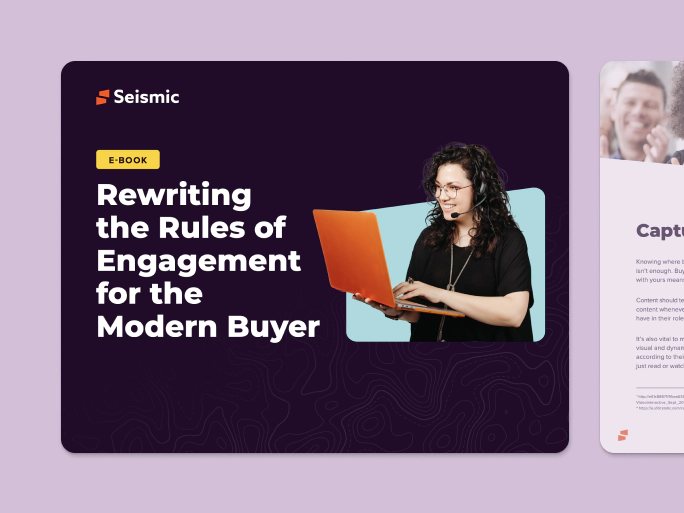What is client engagement?
Client engagement is the act of cultivating impactful connections with prospects. It encompasses any interaction that takes place between sellers and buyers — from connections on social media to direct 1:1 sales calls. When done right, it’s a powerful strategy: reps who effectively engage prospects can foster long-term relationships, improve the sales process, and close more deals.
How engagement has changed
The rise of technology and shift toward remote work has drastically impacted client engagement in recent years. Let’s take a look at some of the major evolutions.
- Proliferation of digital channels: In the past, client engagement activities often took place in person over happy hours, dinners, or conferences. Now, with more people working remotely, as well as a global customer base, engagement largely happens over digital channels. For example, a seller may reach out to a prospect on LinkedIn, exchange emails, and eventually set up a time to connect on a virtual meeting.
- Consultative selling: Traditional selling has been transactional. Reps were laser-focused on closing a deal and often used assertive pitches to do so. Now, consultative selling is more common, with emphasis on understanding a prospect’s specific needs and developing tailored solutions for them, all to build trust over time.
- SaaS sales technology: Advanced enablement and sales engagement tools allow teams to better track interactions, send personalized communications, and measure progress. The proliferation of technology in this space can be overwhelming, but the right tools can empower busy sales teams to reach buyers at scale.
Why is client engagement important?
Effective engagement has many positive benefits, from spurring prospects to action to building long-term advocates for your brand. Here are just a few of the benefits organizations see:
- Higher conversion rates: Consistent and targeted engagement can guide potential customers through the sales funnel more effectively, improving conversion rates. In fact, Salesforce found that companies with strong customer engagement strategies saw a 40% increase in conversion rates.
- Revenue growth: When sellers create meaningful interactions during the buying process, prospects may be open to current and future spend. One study showed that buyers who were fully engaged in the sales process accounted for a 23% increase in company revenue.
- Post-purchase advocacy: An exceptional customer experience can transform satisfied customers into eager brand advocates. 77% of customers who’ve had a positive experience say they will recommend the company to a friend. These customers also may be open to participating in case studies or speaking on behalf of the company, creating influential word-of-mouth testimonials.
Rewriting the Rules of Engagement

The client engagement process
Successful sellers take a thoughtful approach to engagement by understanding their buyer’s needs, tailoring their pitches, and building a relationship that goes beyond the sale. Consider these five key steps reps can take to build a client engagement plan:
Research the buyer
Buyers expect reps to be informed about their needs — even on the first interaction. For reps, this means that research comes first. Learn about the company and the role your prospect holds, and then consider what might have prompted them to seek your services. This sets the stage for a productive first meeting and demonstrates genuine interest in their success.
Connect where they are
In order to stand out, it’s important to meet prospects in the channels where they spend their time. For many, this is on a social media platform like LinkedIn or Twitter. While digital is queen, sellers can also look into the events or conferences that prospects attend and make a valuable in-person connection.
Tailor your pitch
As you start to engage with the buyer, practice active listening and ask questions to understand their current challenges as clearly as possible. A customized consultative pitch is proven to work as 84% of businesses are more likely to buy from reps who understand their goals.
Build a trusted partnership
Today’s sellers are expected to become industry knowledge experts, providing insight and value beyond the product. Managers need to consider how they can help their reps upskill in this area. This is when additional training and coaching programs, as well as opportunities to attend educational events can help sellers improve their craft.
Measure success
Establish clear metrics to measure the effectiveness of your client engagement program. This includes reporting on client interactions or views and engagement with enablement materials.
Did you know?
Organizations that excel at personalization generate 40% more revenue than those that don’t.
Client engagement strategies
By utilizing client engagement best practices, sales teams can effectively connect with clients, drive meaningful conversations, and uncover new revenue opportunities. Let’s dive into some strategies that every go-to-market organization can put into action.
Build a strong digital presence
Buyers often do their own fact-finding before speaking to a rep, most commonly through online channels. It’s important for sales to develop a strong digital presence and be prepared to share personalized content and the right messaging at the right time.
Provide personalized experiences
71% of consumers expect personalized interactions. Tailoring the customer journey and content to individual needs can significantly impact a company’s revenue and customer retention. Organizations that excel at personalization generate 40% more revenue than those that don’t.
Help, don’t sell
Sales teams should adopt a consultative approach, offering valuable insights and solutions, to build credibility and foster relationships that transcend products (or even companies).
Mapping Content to the Customer Journey
How to improve engagement through enablement
Sales enablement provides reps with the tools and resources they need to effectively engage buyers across the customer journey. Here are three key areas where enablement technology can help drive engagement.
1
Deliver personalized and interactive content
2
Provide ongoing training and coaching
3
Track and measure key insights and analytics
Never stop growing.
Ready to take engagement to the next level?
With the Seismic Enablement Cloud™, businesses can effectively streamline and support client engagement with the necessary tools and insights to foster meaningful interactions, create personalized experiences, and train and upskill their teams. Seismic’s sales content management enables reps to discover and deliver engaging, personalized, and informative content throughout the buyer’s journey. Our learning and coaching capabilities also help sellers build client engagement skills through continuous training and 1:1 coaching. Interested in learning more? Get a demo to start honing your team’s client engagement strategy.



